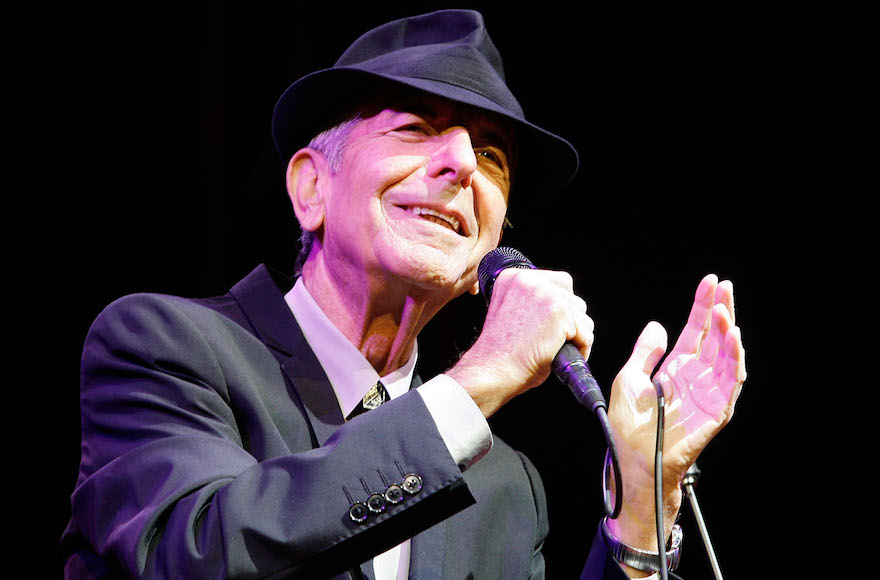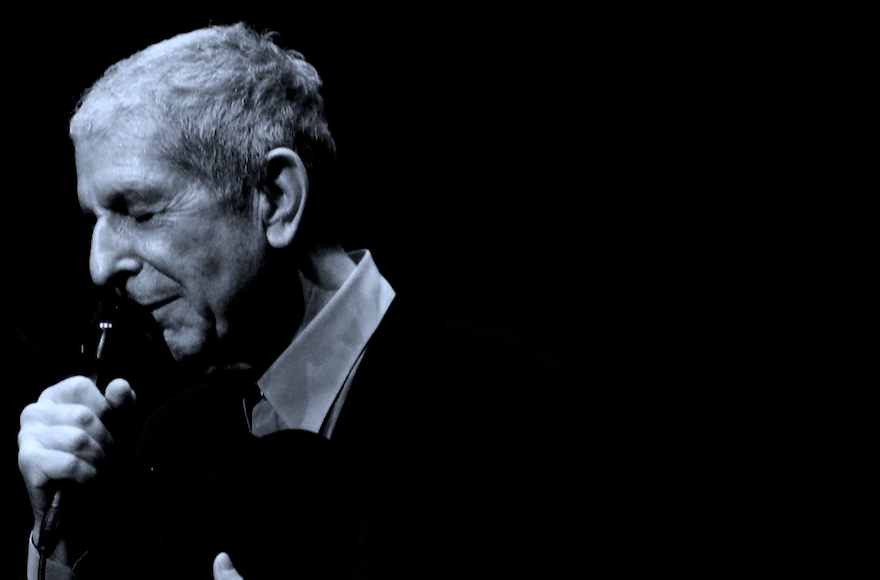
Leonard Cohen performing during the Coachella Valley Music & Arts Festival 2009 at the Empire Polo Club in Indio, Cali., April 17, 2009. (Paul Butterfield/Getty Images)
My buddy and colleague, Dina Kraft, just IMed me a good question — why is Leonard Cohen so beloved in Israel?
It’s not as self-evident as it seems; it’s beyond the simple appreciation for artists willing to perform in Israel, a topic Dina has covered. (Although it helps that Cohen clearly loves Israel back, evidenced by his stubborn insistence on defying boycotters — not an easy choice for someone with his reported financial difficulties. And Amnesty International, by joining the boycott, has discredited its impartiality in a way that makes the Human Rights Watch controversies seem like distractions.)
Dina points out that Cohen, who plays small venues overseas, is able to sell out a stadium in Israel, and, it seems, only in Israel.
He is an artist’s artist: His tributes, in documentaries and in albums, are packed with the best of the best: Bono, k.d. lang. John Cale, R.E.M. He writes about the insanity-inducing loneliness of writing better than anyone alive. It’s why so many lesser songsmiths have covered his “Tower of Song”.
Cale’s version of Cohen’s song, Hallelujah, inspired the late Jeff Buckley’s, who inspired Bon Jovi’s version; and now the song has become a staple of angst montages on teen-centric shows and movies, and even featured in Shrek (when I play it, my sons call it the Shrek song.)
But those demographics barely recognize Cohen; he would not sell out stadiums here in the United States.
There are a number of reasons: Israelis, like many other small nations, are idiosyncratic in their tastes.
A pop song may capture a national imagination for reasons having to do with its promotion by a powerful DJ, with its appearance in a soundtrack on a film that played perhaps on a Friday evening at a time when there was only one TV station and nothing else to watch.
Israeli oldies stations incessantly rotate Brian Hyland’s “Sealed with a Kiss;” I’ve never heard the song stateside. It’s insipid in the extreme, and its popularity in Israel must be a happenstance of history (one that eludes me; its airplay precedes its appearance in the awful “Eskimo Limon”).
Cohen, of course, plumbs much deeper than “pledges to meet in September.”
He’s also a Jewish kid (now 75!) made good in the music biz. There’s always been an affection for these in Israel; I remember Janis Ian popping up in Israel long after her U.S. career was pretty much extinct. Simon and Garfunkel have made Israel a mainstay of reunion tours.
But there’s something more with Cohen, something that sold out his Ramat Gan gig within hours, and led to the flood of status updates by my Israeli Facebook friends chronicling their search for ticket gold. It has two layers.
First, his music is unafraid of Jewishness — he started out playing “The Partisan,” for one thing, and no one in the West slides into biblical exegesis as naturally as Leonard (see “Hallelujah.”) Even his famous reference to Jesus, in Suzanne, is made as an outsider: the Christian messiah as a missed opportunity — a seductive, transfixing opportunity, but one fundamentally missed, and missed by choice. Cohen, famously, did not sleep with the real Suzanne, and we never got into bed with Jesus, and we’re probably all better artists for it.
But I think in Israel, there’s an added layer, and it harkens back to what drove him, in Canadian summer camp (my homeboy!), to learn “The Partisan.”
And he captures it in “First, We Take Manhattan.”
This is another song that barely features in American airplay, but seems to be on perpetual rotation in Israel. (Here’s the video; it’s not embeddable.)
I think it may be just about the best Jewish song written, ever. Only “Ein Li Eretz Aheret” moves me as much.
What’s stunning — search the blogosphere — is that its Western listeners don’t seem to understand that it’s about the Holocaust, or more precisely, about being a Jew in the West after the Holocaust.
I have never been able to travel a continental European city — Paris, Vienna, Salonika — without these lines running through my head:
I’d really like to live beside you, baby
I love your body and your spirit and your clothes
But you see that line there moving through the station?
I told you, I told you, told you, I was one of those
The West will always seem alluring, attractive — and apart. How can we forget the lines moving through the station? I deboarded the Eurostar, the miracle of late 20th century engineering, at Gare du Nord; the lines that moved through that station, just decades before, were peopled with Jewish children.
How could we wipe that from our imaginations?
More saliently for Israelis, though, is how Cohen copes: You want to eroticize me as a vengeful victim? Fine. After decades of this crap, fine. You get your wish.
I’m guided by a signal in the heavens
I’m guided by this birthmark on my skin
I’m guided by the beauty of our weapons
First we take Manhattan, then we take Berlin(snip)
Ah you loved me as a loser, but now you’re worried that I just might win
You know the way to stop me, but you don’t have the discipline
How many nights I prayed for this, to let my work begin
First we take Manhattan, then we take Berlin.
There’s no way that an Israeli could miss the covenantal pun on “birthmark on my skin” and “the beauty of our weapons,” and the irony of being loved as a loser and hated when you win.
Make no mistake, this is a giant “F— You,” to the West, and is profoundly rooted in Jewish culture, something I’ve noted before.
It is not a particularly healthy disposition — at least, not without its corrolary: A place, a space, where you can forget about how non-Jews see you, long to shape you.
That place, of course, is Israel.
And tonight, as I write these words, Leonard Cohen is home.
Sheheheyanu.
JTA has documented Jewish history in real-time for over a century. Keep our journalism strong by joining us in supporting independent, award-winning reporting.






